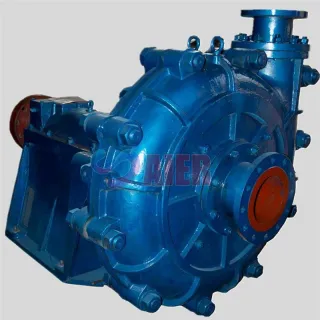Dec . 16, 2024 01:26 Back to list
metal slurry pump
Understanding Metal Slurry Pumps Essential Equipment for Industrial Applications
Metal slurry pumps are vital components in various industrial processes, particularly in the mining, mineral processing, and metallurgical sectors. These pumps are specifically designed to handle abrasive and viscous mixtures of solid and liquid materials, known as slurries. A thorough understanding of their operation, construction, and applications is crucial for ensuring optimal performance and longevity in demanding environments.
The Importance of Metal Slurry Pumps
The primary function of metal slurry pumps is to transport slurries that consist of fine particles suspended in a liquid. These mixtures can be highly abrasive and can contain materials like gravel, ore, coal, and clay. In industries like mining, where the extraction and processing of mineral resources occur, the reliability and efficiency of slurry pumps are paramount. The ability to maintain a continuous flow of slurry without interruption can significantly impact production rates and operating costs.
Design Features of Metal Slurry Pumps
Metal slurry pumps are engineered with specific features to withstand the harsh conditions they often encounter. Key design elements include the following
1. Material Construction The materials used in constructing metal slurry pumps are typically high-resilience alloys or chrome alloy castings. These materials are selected for their ability to resist wear and corrosion caused by abrasive particles in the slurry.
2. Impeller Design The impeller, a critical component of the pump, is designed for efficient handling of slurries. Most slurry pumps feature large, open impellers that reduce clogging and allow for smooth passage of solids. Additionally, the impeller's shape and angle are optimized to enhance hydraulic performance and minimize energy consumption.
3. Casing Configuration The pump casing is designed to provide maximum hydraulic efficiency while minimizing wear. Many slurry pumps are equipped with replaceable liners that can be easily swapped out when worn, significantly extending the pump's operational life.
metal slurry pump

4. Sealing Mechanisms Due to the abrasive nature of the slurries they handle, metal slurry pumps incorporate specialized sealing systems to prevent leakage and reduce wear on internal components. Mechanical seals, for instance, are commonly used to ensure tight operation under high pressure and flow conditions.
Applications of Metal Slurry Pumps
Metal slurry pumps find applications in various industries beyond mining. Some notable uses include
- Mineral Processing They are used in the transportation of slurries during ore processing, including thickening, grinding, and flotation processes.
- Waste Management In industries dealing with waste slurries, such as dredging or sewage treatment, these pumps can handle the transport of sludge and other viscous materials.
- Power Generation Metal slurry pumps are utilized in power plants for the transportation of coal slurry and ash removal systems, contributing to the efficient operation of thermal power stations.
- Construction In the construction industry, they transport concrete and other materials that contain aggregates, ensuring efficient material delivery on job sites.
Conclusion
Metal slurry pumps are indispensable tools in industries that rely on the effective movement of abrasive mixtures. Their robust design, tailored for handling challenging slurries, underscores their role in maintaining productivity and efficiency across various applications. Understanding the key features and operational principles of these pumps allows industrial operators to select the right model for their needs, ultimately preventing downtime and ensuring a smooth workflow. Continuous advancements in pump technology promise to enhance their performance further, thereby meeting the rising demands of modern industrial operations.
-
Top Submersible Pump Companies High Quality Manufacturers & Suppliers in China
NewsJul.08,2025
-
High Quality Seal for 5 Inch Dredge Pump Reliable China Manufacturer & Supplier
NewsJul.08,2025
-
High-Efficiency Slurry Sand Pump from Leading China Manufacturer – Durable & Reliable Solutions
NewsJul.07,2025
-
High-Quality Slurry Pump Made in China Durable Steel Mill Slurry Pump & Parts
NewsJul.07,2025
-
High Quality Excavator Dredge Pump Manufacturer & Suppliers from China – Reliable, Durable, Efficient Solutions
NewsJul.07,2025
-
Wholesale Slurry Pump Closed Impeller Supplier High Efficiency China Slurry Pump Closed Impeller
NewsJul.06,2025
